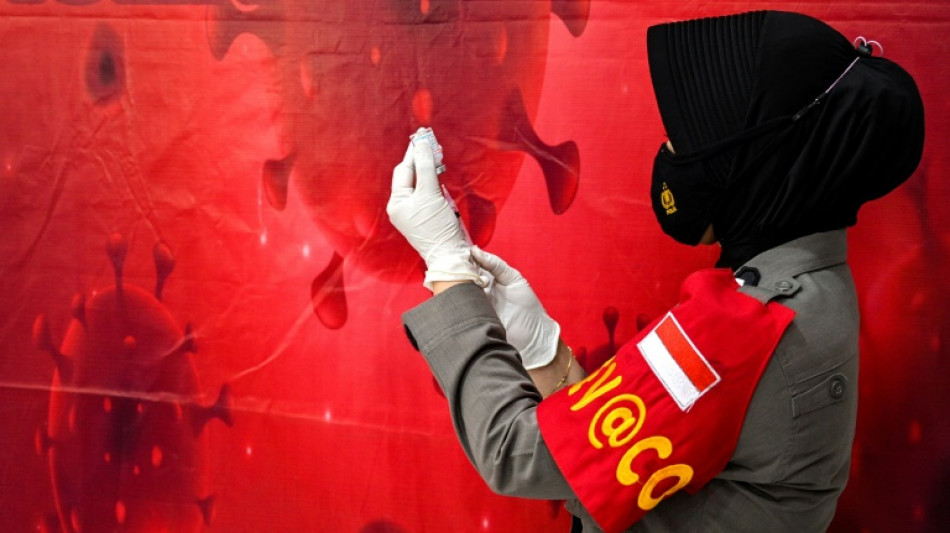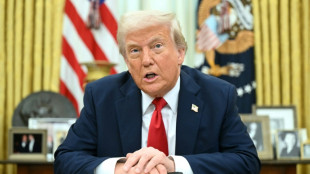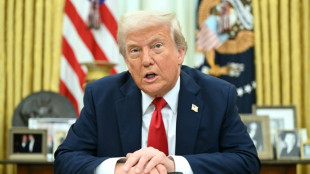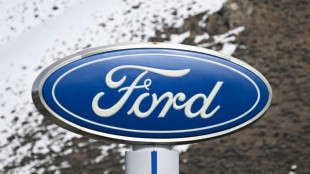
| CMSC | 0.18% | 22.441 | $ | |
| RBGPF | 1.47% | 68 | $ | |
| GSK | -2.01% | 37.975 | $ | |
| SCS | 3.21% | 11.324 | $ | |
| RIO | 0.18% | 60.189 | $ | |
| BTI | -0.93% | 40.989 | $ | |
| BCE | -1.12% | 22.705 | $ | |
| NGG | 0.18% | 65.73 | $ | |
| RELX | 0.3% | 50.56 | $ | |
| RYCEF | 3.87% | 10.09 | $ | |
| AZN | -1.42% | 72.47 | $ | |
| VOD | -1.24% | 9.255 | $ | |
| BP | -0.33% | 33.68 | $ | |
| JRI | 0.44% | 12.997 | $ | |
| BCC | 0.42% | 98.5 | $ | |
| CMSD | 0.02% | 22.815 | $ |

Covid-flu joint booster jab possible late 2023: Moderna
Moderna aims to roll out a combined Covid-flu-RSV booster vaccine in late 2023, the US pharmaceutical firm said Monday, hoping a joint jab would encourage people to get an annual shot.
The single vaccine for Covid-19, influenza and respiratory syncytial virus -- a common virus that causes the cold, but can be more serious for infants and elderly people -- could appear on the market before 2024.
"Best-case scenario will be the fall of '23," Moderna chief executive Stephane Bancel told a virtual World Economic Forum roundtable session.
"I don't think it would happen in every country, but we believe it's possible to happen in some countries next year.
"Our goal is to be able to have a single annual booster so that we don't have compliance issues where people don't want to get two to three shots a winter, but to get one dose."
- Trials in progress -
Bancel said the RSV programme was in Phase III trials -- the final stage of human testing -- while the flu programme should be entering Phase III in the second quarter of this year.
Moderna's experimental flu shot, targeting four major strains, is based on the same mRNA method used in its Covid-19 jabs.
The technology provokes an immune response by delivering genetic molecules containing the code for key parts of a pathogen into human cells.
While Moderna's Covid-19 vaccine was based on the original strain of the virus, it was working on finishing an Omicron-specific jab within weeks, ahead of trials, said Bancel.
"We're hoping in the March timeframe we should be able to have data to share with regulators to figure out the next step forward."
- Hunt for 'holy grail' -
Beyond a vaccine specific to Omicron -- which is rapidly becoming the world's dominant strain -- laboratories are also pursuing a vaccine that works against all current and future Covid-19 mutations.
"There's some private sector partners that are pursuing it," said Richard Hatchett, chief executive of the Coalition for Epidemic Preparedness Innovations, which funds vaccine research and development.
"That would be the holy grail because we really don't want to be in position where we're chasing the new variants that are going to come.
"We don't want to be in a position where we're having to vaccinate everybody in the world every three or six months, or even annually, ideally."
Top US pandemic advisor Anthony Fauci added: "We really don't want to get into the whack-a-mole approach towards every new variant... because you'd be chasing it forever."
Bancel meanwhile said that Moderna had shipped 807 million doses of Covid-19 vaccine in 2021, of which a quarter went to middle- and low-income countries.
Thanks to extra capacity coming on stream before the end of March, the company hopes to be able to make two to three billion doses this year.
L.Marino--IM



